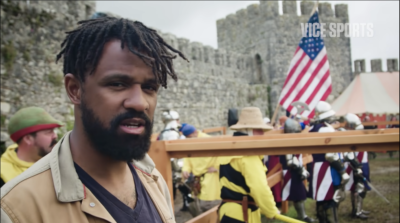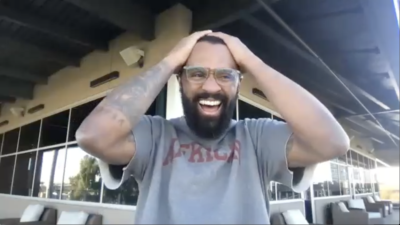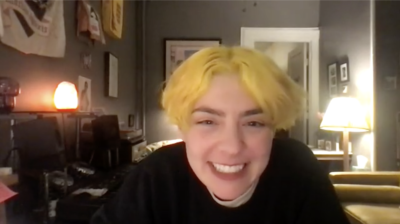The Unexpected Host
March 19, 2022
Text by Becca Kauffman with Fernando Perez
Becca Kauffman with Fernando Perez
“Many things would fall out of disrepair if they were not held together by a thing; that’s what caulking does, that’s what the mortar between bricks does. You can do that socially. Good hosts have all done that socially.”
FERNANDO PEREZ
It’s not every day you wind up bonding with a complete stranger who sold you a drum machine on Craigslist. But a few weeks ago, I did. His name is Fernando Perez, and his energetic speech, booming voice, and overall personability made it apparent that he was not your average craigslist seller.
It happened like this: I was scrolling through the “for sale” section, clicked on an ad for a Roland drum pad, and was entranced by the bizarrely excellent video Perez had recorded to showcase the instrument. It was so excellent, in fact, I felt compelled to verge off the topic of logistics and email him this compliment:
“Watched your vid— felt like a high caliber youtube product review.
Fully enjoyed and feel like you could, like, do that for a living?”
As it turns out, he actually does. When Fernando dropped the drum machine off at my apartment a day later, I asked him how he developed the skill of comfortably playing the role of a salesman and found out that he’s no stranger to the camera. After a 10-year career as a professional baseball player with the Tampa Bay Rays, he became an on-air sports commentator and a host for Vice News. He was anchoring documentary field pieces on the football championships in North Africa, medieval-themed MMA battles, and the ancient Japanese religion Shugendo.
“You’re a host???” I gasped. “I’m a host!” This was even more exciting than my newly acquired drum gear. For the past two months, I’ve been offering my services in New York City as a professional host-for-hire. I fashion the role of host as a bridge that connects my training as a performer to my desire to be practically useful. I see hosting as a kind of social glue that creates cohesion in an otherwise chaotic scenario. My hosting investigation naturally began as an emcee for concerts and variety shows, having cultivated a particularly hospitable alter ego named Jennifer Vanilla over the past six years. So while sports and alt pop music seemingly don’t have much to do with one another, Fernando’s and my shared experiences in entertainment eclipsed the contextual differences. The role of host, I was learning, transcends genre and environment.
Having never met a professional host before, I had to learn more about Fernando’s take on the position. We chatted excitedly in my living room until I’d entirely forgotten how and why we’d met, and he began to worry about his car double parked outside.
“We’ve got to keep talking about this,” I said as he stepped into his sedan and turned the hazards off. “Sure,” he said, “I’m always up for a chat!” A few weeks later, we convened over video chat— me from New York, Fernando from a baseball stadium in California where he’s doing some consulting work— to continue our conversation.
Becca Kauffman: Tell me how you got into hosting.
Fernando Perez: I fell into it. I’ve never been very good with goals; even the decision to play baseball was much more of one where like, I was at school, and there are all of these helicopter parented kids who were running off to their internships. And there was my baseball coach saying, “You’re actually really good at baseball, you should take it seriously.” Next thing I know, I was a professional baseball player [for the next ten years]. [When that ended] I was [like] a 21-year-old 31-year-old. And I was like, “What can I do? Because nobody’s feeling me on LinkedIn. I don’t have any skills.” Most athletes use that cachet to be a coach, or they do a sales job. So for me, I’m like, “What is out there for me to do?” I had many of the natural skills of hosting. Then it was just getting the opportunity to be in the room with a casting person who was just like, “You know what, I think this is gonna work.” I was allowed to grow into the job. It was a way to have an adventure. It’s become a thing that is really, really important to me.

Becca: Part of the reason why I’m interested in hosting is because I feel like it puts you on an equal playing field with people, where you’re sharing the spotlight rather than seizing it. What’s important about the role to you?
Fernando: It’s really become a part of me. It’s a heightened form of communication. People are not as good at talking to each other today as they were 10 years ago. Maybe the new form of in-person contact is, you know, a TV show, right?
Most of my professional experience is of this facilitative sort, where I am there to help an interesting person deliver their exotic expertise to curious viewers. This kind of content can be made without a host, where producers ask questions off camera. But adding a host is an option that producers often take that will bring different dimensions to a piece. For instance: the interview subject behaves differently with a host, and the viewers get to respond to the host’s body language. While the huge, complex, even contradictory idea of “hosting” is super fascinating, and worthy of a long study— I’m mostly speaking on what I’ve done.
Becca: Hosting as a way to have adventures makes me think of hosting as a kind of passport. It gives you this alibi to interact and engage. What are the main functions of the host for you? How do you see your job?
Fernando: It is a passport. You learn so much about people. What I need to do is be a conduit, so that people can experience this thing through me. I’m a mirror, basically. Many things would fall out of disrepair if they were not held together by a thing; that’s what caulking does, that’s what the mortar between bricks does. You can do that socially. Good hosts have all done that socially. Another version of it is a sleight of hand thing, like, “Look over here. Don’t pay attention to the fact that there’s this thing in the room!”
Becca: I’ve definitely experienced that too, distracting from technical difficulties, unforeseen complications, or filling up airtime when something goes awry. It’s a kind of social acrobatics.
Fernando: For an audience of people at home, they’re going to experience an event [that I host] through me. I’m like an antenna. A barometer. I’m trying to open myself up to feeling as much as possible. You want to be neutral, because you don’t want to influence people.
Becca: You’re almost a stand-in for whoever is watching, so that they can put themselves in your shoes and have that experience through you.
Fernando: Yeah, perhaps you are. Something that I know I’ve done very well is the unseen work of hosting. The visible part is the product that you see on television; the not visible part is all of the work that it took to get my interview subjects into the right frame of mind. That’s my favorite part of the job: allaying people’s fears that we’re going to make them look stupid on television, making them as comfortable as possible. The camera is a super powerful cue, it’s like having an unstable element in the room. So a lot of it is just trying to convince the guest that the camera is not going to hurt you.
Becca: As a self-made host, how did you arrive at that value, of tending to your interview subjects and making them comfortable?
Fernando: Seeing that it was needed. In the same way that somebody might invite you to their apartment, and you’re just like, “Oh, man, if we open the shades, and put this over there, it really opens up the apartment.” I learned by doing it. I was naturally in possession of many of the soft skills that are valuable to good hosts, and that’s why I got the opportunity to learn on the fly. It was just being on enough shoots and being like, Man, the cameraman is playing with his phone, the producer is worried about getting our next interview subject, the sound guy is chomping down on a granola bar, and the people that we’re about to interview are just sitting there looking kind of scared. I should just talk to them. Somebody has to do it.
Becca: It’s almost like you’re hosting the host position, adding off-camera hospitality to a role that might normally only be hospitable when the cameras are rolling.
Fernando: [It helps to] be ultimately flexible and really be obsessed with making people comfortable. This is a shitty example in many ways, but the only reason I use it is because it’s happened to me so many times: if you spit on me in the middle of us talking, and I stop to make a deal of it, I’m making you less comfortable, and the TV is not going to be as good as it would be if I just don’t flinch. A host is egoless, if possible.
Becca: You’re saying you kind of have to suspend your humanity, while coming off as a very human person.
Fernando: If you’re extremely empathic, that is reliably a good way to bring the best out of interview subjects. The person that you’re interviewing has to trust you. If you’re sitting next to someone on a train, and they seem extremely empathic, there you are telling your life story and divulging all these crazy details that you haven’t even told your best friends. And how did that happen? They were empathic.
Another form of empathy is not being “cool.” Being a weirdo definitely helps. If you were to meet a person on the street, and they were like, “Yeah, on the weekends I like to role play as a medieval combat fighter,” if you’re just like, “Cool,” naturally, the job’s gonna be easy, right? If you’re too cool for school, [you] can’t be a good host.

Here’s another thing that’s part of it: you have to play dumb a bit. Hosting should not be an opportunity to prove that you’re super clever. The object of the game is to make people that are watching smarter, more informed, or entertained, depending on what type of television show it is. Playing dumb for me is more about, I may know the answer to something, or may think I know the answer. What’s so much better is if I ask you the question, in a way that I think sets you up for success to answer that question. And I just look at you like you’re my grandfather, or my grandmother, [like] you are right about to give me infinite wisdom. All that I’m trying to do is pull information out. That’s the game.
Becca: Right, there are so many different ways to talk about the same thing, but it’s important to meet your audience where they’re at.
Fernando: Meeting them where they’re at is a very lovely way to think about it. We know what it feels like to talk to a genius who is just not sounding like a genius. So what I need to do is figure out a way to get you to bring out that really fascinating information. One that always works is, “Pretend that I’m an alien that has just dropped on the planet. And I just do not understand how this works. Explain it to me like I’m an idiot, or like I’m young.” That helps people because, if you’re a scientist, you’re good at science; you’re not necessarily good at explaining science to people that don’t get science. Hosts are always bringing people into the conversation. A great host can put [things] into a context that relates to more people, or remind the experts that non-experts are in the room and want to learn.
As a rule, it’s always really nice to make you quite certain that I’m a person who is legitimately interested in you, and that I have done some research. Almost everyone loves to be flattered.
Becca: “Playing dumb” can also express itself as hospitality, where you open up this channel for more inclusion by exposing an ignorance of your own. Sort of as a stand in for a similar ignorance you’re sensing amongst the guests. You kind of take one for the team.
Fernando: Self-deprecation goes a long way in virtually everything. I remember, I was interviewing this woman who was a fucking NASA scientist. She was so nervous. I spent 10 minutes talking to her about aliens, telling her that I think that maybe she’s the coolest person that I’ve ever met. She said to me, “You seem so cool.” And I was just like, “Actually, I have swamp ass.” People assume since you are playing host and looking nice, that you must be just fucking marvelous. Well, it really, really helps to kind of deprecate that. It really, really, really, always helps.


Becca Kauffman (they/them) is an artist and performer based in New York City working within a social practice framework to create hospitable environments through the practical use of their own soft skills. Using chance encounters, conversation, and citizen journalism, they rely on resourcefulness, adaptability, communication, and problem-solving to understand and strengthen the social choreography of public spaces. They are an MFA candidate in Art and Social Practice at Portland State University, where they are researching live action role play, tactical urbanism, and hosting as a form of public stewardship.
Fernando Perez (he/him) is the Director of Video Coaching for the San Francisco Giants. After a decade playing baseball professionally, he moved into media, hosting TV and digital content at outlets like Vice, Bleacher Report and MSG Network. He co-leads the media strategy at Canopy Collective, a reparations-centered startup advancing democracy for all in the United States.


